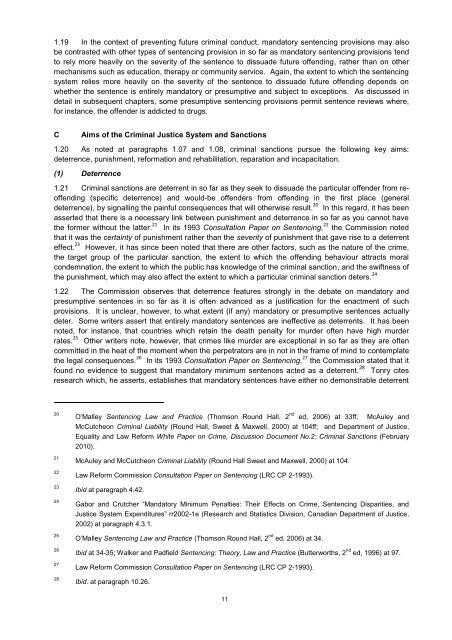Report on Mandatory Sentences - Law Reform Commission
Report on Mandatory Sentences - Law Reform Commission
Report on Mandatory Sentences - Law Reform Commission
You also want an ePaper? Increase the reach of your titles
YUMPU automatically turns print PDFs into web optimized ePapers that Google loves.
1.19 In the c<strong>on</strong>text of preventing future criminal c<strong>on</strong>duct, mandatory sentencing provisi<strong>on</strong>s may also<br />
be c<strong>on</strong>trasted with other types of sentencing provisi<strong>on</strong> in so far as mandatory sentencing provisi<strong>on</strong>s tend<br />
to rely more heavily <strong>on</strong> the severity of the sentence to dissuade future offending, rather than <strong>on</strong> other<br />
mechanisms such as educati<strong>on</strong>, therapy or community service. Again, the extent to which the sentencing<br />
system relies more heavily <strong>on</strong> the severity of the sentence to dissuade future offending depends <strong>on</strong><br />
whether the sentence is entirely mandatory or presumptive and subject to excepti<strong>on</strong>s. As discussed in<br />
detail in subsequent chapters, some presumptive sentencing provisi<strong>on</strong>s permit sentence reviews where,<br />
for instance, the offender is addicted to drugs.<br />
C<br />
Aims of the Criminal Justice System and Sancti<strong>on</strong>s<br />
1.20 As noted at paragraphs 1.07 and 1.08, criminal sancti<strong>on</strong>s pursue the following key aims:<br />
deterrence, punishment, reformati<strong>on</strong> and rehabilitati<strong>on</strong>, reparati<strong>on</strong> and incapacitati<strong>on</strong>.<br />
(1) Deterrence<br />
1.21 Criminal sancti<strong>on</strong>s are deterrent in so far as they seek to dissuade the particular offender from reoffending<br />
(specific deterrence) and would-be offenders from offending in the first place (general<br />
deterrence), by signalling the painful c<strong>on</strong>sequences that will otherwise result. 20 In this regard, it has been<br />
asserted that there is a necessary link between punishment and deterrence in so far as you cannot have<br />
the former without the latter. 21 In its 1993 C<strong>on</strong>sultati<strong>on</strong> Paper <strong>on</strong> Sentencing, 22 the Commissi<strong>on</strong> noted<br />
that it was the certainty of punishment rather than the severity of punishment that gave rise to a deterrent<br />
effect. 23 However, it has since been noted that there are other factors, such as the nature of the crime,<br />
the target group of the particular sancti<strong>on</strong>, the extent to which the offending behaviour attracts moral<br />
c<strong>on</strong>demnati<strong>on</strong>, the extent to which the public has knowledge of the criminal sancti<strong>on</strong>, and the swiftness of<br />
the punishment, which may also affect the extent to which a particular criminal sancti<strong>on</strong> deters. 24<br />
1.22 The Commissi<strong>on</strong> observes that deterrence features str<strong>on</strong>gly in the debate <strong>on</strong> mandatory and<br />
presumptive sentences in so far as it is often advanced as a justificati<strong>on</strong> for the enactment of such<br />
provisi<strong>on</strong>s. It is unclear, however, to what extent (if any) mandatory or presumptive sentences actually<br />
deter. Some writers assert that entirely mandatory sentences are ineffective as deterrents. It has been<br />
noted, for instance, that countries which retain the death penalty for murder often have high murder<br />
rates. 25 Other writers note, however, that crimes like murder are excepti<strong>on</strong>al in so far as they are often<br />
committed in the heat of the moment when the perpetrators are in not in the frame of mind to c<strong>on</strong>template<br />
the legal c<strong>on</strong>sequences. 26 In its 1993 C<strong>on</strong>sultati<strong>on</strong> Paper <strong>on</strong> Sentencing, 27 the Commissi<strong>on</strong> stated that it<br />
found no evidence to suggest that mandatory minimum sentences acted as a deterrent. 28 T<strong>on</strong>ry cites<br />
research which, he asserts, establishes that mandatory sentences have either no dem<strong>on</strong>strable deterrent<br />
20<br />
21<br />
22<br />
23<br />
24<br />
25<br />
26<br />
27<br />
28<br />
O’Malley Sentencing <strong>Law</strong> and Practice (Thoms<strong>on</strong> Round Hall, 2 nd ed, 2006) at 33ff; McAuley and<br />
McCutche<strong>on</strong> Criminal Liability (Round Hall, Sweet & Maxwell, 2000) at 104ff; and Department of Justice,<br />
Equality and <strong>Law</strong> <strong>Reform</strong> White Paper <strong>on</strong> Crime, Discussi<strong>on</strong> Document No.2: Criminal Sancti<strong>on</strong>s (February<br />
2010).<br />
McAuley and McCutche<strong>on</strong> Criminal Liability (Round Hall Sweet and Maxwell, 2000) at 104.<br />
<strong>Law</strong> <strong>Reform</strong> Commissi<strong>on</strong> C<strong>on</strong>sultati<strong>on</strong> Paper <strong>on</strong> Sentencing (LRC CP 2-1993).<br />
Ibid at paragraph 4.42.<br />
Gabor and Crutcher “<strong>Mandatory</strong> Minimum Penalties: Their Effects <strong>on</strong> Crime, Sentencing Disparities, and<br />
Justice System Expenditures” rr2002-1e (Research and Statistics Divisi<strong>on</strong>, Canadian Department of Justice,<br />
2002) at paragraph 4.3.1.<br />
O’Malley Sentencing <strong>Law</strong> and Practice (Thoms<strong>on</strong> Round Hall, 2 nd ed, 2006) at 34.<br />
Ibid at 34-35; Walker and Padfield Sentencing: Theory, <strong>Law</strong> and Practice (Butterworths, 2 nd ed, 1996) at 97.<br />
<strong>Law</strong> <strong>Reform</strong> Commissi<strong>on</strong> C<strong>on</strong>sultati<strong>on</strong> Paper <strong>on</strong> Sentencing (LRC CP 2-1993).<br />
Ibid. at paragraph 10.26.<br />
11
















